|
|
|
Sort Order |
|
|
|
Items / Page
|
|
|
|
|
|
|
| Srl | Item |
| 1 |
ID:
110761
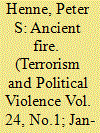

|
|
|
|
|
| Publication |
2012.
|
| Summary/Abstract |
Does religion lead to greater destructiveness from suicide terrorism? And if so, how does it influence this form of political violence? Recent analyses of terrorism point to the significance of religion, but are divided as to whether religion itself matters, or certain types of religious terrorist groups are actually driving suicide terrorist violence. This article draws on social movement theory and recent work in the study of suicide terrorism to argue that religion influences the severity of suicide terrorist attacks as an ideology groups use to justify their struggle and gain public support. This effect occurs regardless of a group's goals or organizational nature. The theory is tested using a generalized estimating equation to account for multiple attacks by several groups. The study finds that the religious ideology of a group greatly increases the number of deaths from a suicide attack, even if varying group motivations and structural factors are taken into account. The article helps to clarify the effect of religion on contemporary terrorism, contributing to the study of both terrorism and religion and politics.
|
|
|
|
|
|
|
|
|
|
|
|
|
|
|
|
| 2 |
ID:
183023
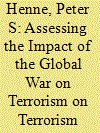

|
|
|
|
|
| Summary/Abstract |
After the 9/11 terrorist attacks, the United States called on Muslims to join it in its struggle against the attacks’ perpetrator, Al Qaeda (AQ). U.S. officials argued that Muslim states’ participation in these efforts could help the United States defeat AQ, but it could also benefit the states themselves by undermining the threat they faced from terrorism. As we are now over ten years out from the beginning of this global war on terrorism, it is possible to both ask and answer the question posed by U.S. demands: did it work? That is, did majority-Muslim states who implemented counterterrorism policies in line with America’s counterterrorism priorities benefit from this, through a reduction in the threat of terrorism? In this article, I argue that Muslim states that adopted policies in line with US priorities would accomplish their primary goal: disrupting Al Qaeda’s ability to carry out attacks. I use a quantitative analysis to demonstrate that states implementing the counterterrorism policies preferred by the United States experienced significantly fewer deaths from terrorist attacks than those that did not. These findings can contribute to debates over the global war on terrorism, as well as broad debates on effective counterterrorism and counterinsurgency tactics.
|
|
|
|
|
|
|
|
|
|
|
|
|
|
|
|
| 3 |
ID:
176671
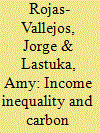

|
|
|
|
|
| Summary/Abstract |
This paper investigates the marginal effect of income inequality on carbon emissions per-capita. We use a panel consisting of 68 countries over a 50-year period from 1961 to 2010. We report estimates that support the hypothesis that there is a trade-off between carbon emissions per-capita and income inequality. This trade-off is not homogeneous across countries and depends upon the level of development measured by income per-capita. Using panel smooth transition regression, we find that this relationship is negative for countries with low to moderate income per-capita but becomes slightly positive after passing a threshold located around fifteen thousand 2011 US dollars. Moreover, the inequality elasticity of emissions per-capita is comparable in magnitude to its income elasticity. Therefore, both inequality and income levels are crucial to define policies to reduce carbon emissions. This implies a challenge to policymakers who pursue to reduce both income inequality and carbon emissions.
|
|
|
|
|
|
|
|
|
|
|
|
|
|
|
|
| 4 |
ID:
166665
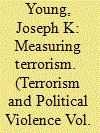

|
|
|
|
|
| Summary/Abstract |
In the conceptual literature on terrorism, there is no shortage of answers to the question: “What is terrorism?” Indeed, the terrorism literature has been heavily criticized for a deluge of definitions. And yet the booming quantitative terrorism literature generally examines a narrow set of “what is terrorism?”: how country-level factors explain variation in the number of terrorist attacks. This article demonstrates the variety of ways in which scholars currently operationalize terrorism and compares them to the ways it could be operationalized. I replicate studies using alternative operationalizations of terrorism to examine the consequences of the terrorism literature’s collective bet to focus on attack counts at the country level. Finally, I discuss the implications of the narrow set of operational choices with an eye towards how a greater variety of approaches would produce a more robust research agenda.
|
|
|
|
|
|
|
|
|
|
|
|
|
|
|
|
| 5 |
ID:
026483
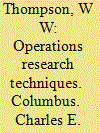

|
|
|
|
|
| Publication |
Columbus, Charles E. Merrill Books, Inc., 1967.
|
| Description |
xiii, 157p.Pbk
|
|
|
|
|
|
|
|
|
|
|
|
Copies: C:1/I:0,R:0,Q:0
Circulation
| Accession# | Call# | Current Location | Status | Policy | Location |
| 000935 | 658.4034/THO 000935 | Main | On Shelf | General | |
|
|
|
|
| 6 |
ID:
155295
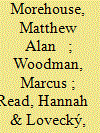

|
|
|
|
|
| Summary/Abstract |
Can quantitative methods training be successfully fused with content courses? With the continuing rise of “Big Data,” familiarity with quantitative research methods is an increasingly necessary skill set in the workplace. This article provides an in-depth “how-to” guide and framework for implementing methods training into content courses. In this program, students (in both lower and upper division courses) carry out dataset construction, along with data analysis, using the R, R commander, and Gretl statistical programs. Tips are provided for addressing issues that instructors and students may face. Finally, discussions and reflections from the course instructor and representative students suggest that integrating quantitative methods training into topical courses can provide students with a greater appreciation and understanding of social scientific research, along with providing them with a toolkit of skills that can be expanded upon and assist them in the job market.
|
|
|
|
|
|
|
|
|
|
|
|
|
|
|
|
| 7 |
ID:
109703
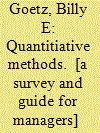

|
|
|
|
|
| Publication |
New York, McGraw-Hill Book Company, 1965.
|
| Description |
xxix, 541p.hbk
|
|
|
|
|
|
|
|
|
|
|
|
Copies: C:1/I:0,R:0,Q:0
Circulation
| Accession# | Call# | Current Location | Status | Policy | Location |
| 002389 | 658/GOE 002389 | Main | On Shelf | General | |
|
|
|
|
| 8 |
ID:
128873
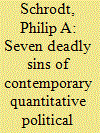

|
|
|
|
|
| Publication |
2014.
|
| Summary/Abstract |
A combination of technological change, methodological drift and a certain degree of intellectual sloth, particularly with respect to philosophy of science, has allowed contemporary quantitative political analysis to accumulate a series of dysfunctional habits that have rendered much of contemporary research more or less meaningless. I identify these 'seven deadly sins' as: Garbage can models that ignore the effects of collinearity; Pre-scientific explanation in the absence of prediction; Excessive reanalysis of a small number of datasets; Using complex methods without understanding the underlying assumptions; Interpreting frequentist statistics as if they were Bayesian; A linear statistical monoculture that fails to consider alternative structures; Confusing statistical controls and experimental controls. The answer to these problems is not to abandon quantitative approaches, but rather engage in solid, thoughtful, original work driven by an appreciation of both theory and data. The article closes with suggestions for changes in current practice that might serve to ameliorate some of these problems.
|
|
|
|
|
|
|
|
|
|
|
|
|
|
|
|
| 9 |
ID:
096215
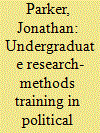

|
|
|
|
|
| Publication |
2010.
|
| Summary/Abstract |
Unlike other disciplines in the social sciences, there has been relatively little attention paid to the structure of the undergraduate political science curriculum. This article reports the results of a representative survey of 200 political science programs in the United States, examining requirements for quantitative methods, research methods, and research projects. The article then compares the results for the United States with a survey of all political science programs in Australia, Canada, Finland, the Netherlands, Norway, Sweden, and the United Kingdom. The results suggest (1) that the state of undergraduate methods instruction is much weaker in the United States than indicated in previous research, (2) this pattern is repeated in other countries that emphasize broad and flexible liberal arts degrees, and finally (3) this pattern of weak methods requirements is not found in more centralized, European higher education system that emphasize depth over breadth. These countries demonstrate a consistent commitment to undergraduate training in research methods that is followed up with requirements for students to practice hands-on research. The model of weak methods requirements in the discipline is not the norm internationally, but differs depending upon the type of higher education system.
|
|
|
|
|
|
|
|
|
|
|
|
|
|
|
|
| 10 |
ID:
146607
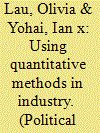

|
|
|
|
|
|
|
|